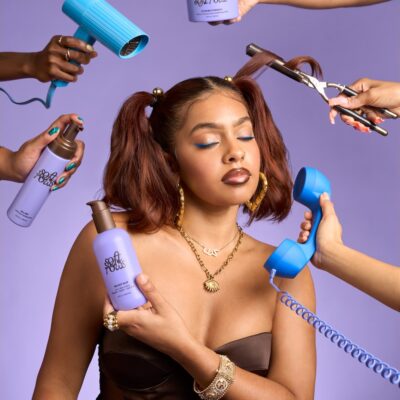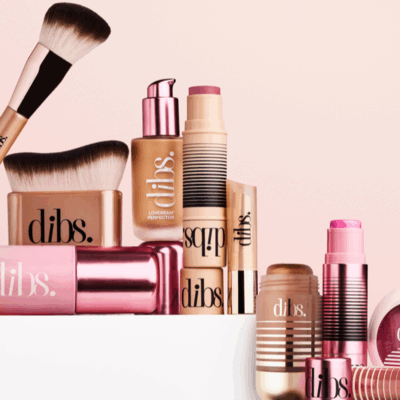
B-Glowing’s Lisa King Is Back With New Brand Zen Dew To Combat Skincare Overwhelm
Lisa King has decision fatigue fatigue.
After over 20 years in the beauty industry—she founded the beauty e-tailer b-glowing in 2004 and later expanded it to makeup brand b-glowing Beauty—she’s practically seen it all, from newfangled devices to nearly every dupe. She believes it’s time for products that cut through the confusion and cross audiences and purposes.
Together with Erika D’Amboise, former creative director at b-glowing, King has introduced Zen Dew, a versatile skincare brand that describes itself as a “modern solution alternative to the noise” with accessibly priced products packed with results-driven, in-demand ingredients like snail mucin, snow mushroom, azulene, rice extract and ectoin. It quietly made its debut in October last year with three products under $25 each: $24.99 Moon Milk Glow Gel Serum, $23.99 Star Light Glow Serum and $17.99 Violet Aura BHA Rice Toner.
“At this point in my life, the brand reflects where I’m at. There is so much noise out there, and it causes anxiety, it’s stressful,” says King, 60. “I wanted to create something that was super simple, that was really about luxury performance, obviously without the price tag, but it really did what it said it did, and it was multifunctional so you didn’t have to have 10 products in a routine, you just know it works.”

King, who was in advertising and spent almost eight years at agency Wieden + Kennedy prior to transitioning to beauty, could’ve walked away from the beauty business. She sold b-glowing to eCosmetics in 2022 and admits a push to grow the business prior to the sale—it was accelerating at a triple-digit pace back then—took a toll on her. A breast cancer survivor and mother to a teen daughter, she’s highly aware of her quality of life and personal limits.
But she’s never fully exited the beauty business since exiting b-glowing’s e-commerce platform. Although she sold it, she kept advising beauty brands on their Amazon strategies. And she’s motivated to establish businesses. Before Zen Dew, she tried to do a wool coaster brand, but discovered the cost of developing it rendered it untenable. “Work is my hobby,” confesses King.
She estimates that she invested $80,000 to $100,000 to bring Zen Dew to market. She aims for it to reach $300,000 in year one sales and $1 million by year two. Leveraging King’s Amazon skills, Zen Dew has launched on the giant e-commerce destination along with direct-to-consumer distribution. Moon Milk has been an early bestseller. It sold out in two months and was out of stock for three months at the beginning of this year.
The products are formulated for various skin types and concerns. No matter if you have acne, fine lines or unevenness, King pledges they’re for you. In a 28-day consumer perception study with 30 women aged 18 to 51 years old, the participants reported the products plumped, smoothed and added glow to their skin.
“Consumers crave fewer, better products from brands, and they are drawn to products and brands that feel human.”
To play the Amazon game, King understands the power of search. Currently, “snail mucin” is a search term that calls up Zen Dew. Moon Milk and Star Light have drawn over 100 reviews on Amazon, and Zen Dew’s trio of products have a minimum of 4.4-star ratings. The brand manufactures in South Korea, although King doesn’t classify it as a K-Beauty brand as she surmises there may be products in the future not manufactured in South Korea.
King isn’t banking on a searchable hero ingredient alone. To spread the word about Zen Dew, the brand is focused on social media, email marketing and affiliate partnerships. For a limited period, it’s offering up to 50% affiliate commission. King figures at least 50% of its revenues are being dedicated to marketing and advertising for now.
“Our goal is to build our brand identity and to have people search for Zen Dew. I don’t want to compete on key words,” she says. “I want people to hear about our products and have the opportunity to try it and search for Zen Dew.”
King thinks the days of unbranded Amazon brands without clear identities are fading fast. She designed Zen Dew to suit the Amazon ecosystem—and distribution beyond it. It has a dreamy psychedelic look with a wash of warm sunset hues like peach, pink and yellow set against white. King explains it reinforces the brand’s messaging about being in the present or in the flow. She says, “Going into Amazon, we wanted to treat it no differently than we would a Sephora.”

A cleanser, calming serum and eye cream are in Zen Dew’s product pipeline, and another product is slated for release by the end of the year. “Our brand philosophy is less is more. There’s not a roadmap to make hundreds of SKUs,” says King. “I really want it to be a collection that works, and that people are loyal to.”
King’s biggest lesson from her previous beauty businesses is to move slower and with intention. “There is so much pressure to frequently launch new SKUs, go viral and constantly chase attention,” she says. “Consumers crave fewer, better products from brands, and they are drawn to products and brands that feel human.”
Ultimately, King aspires for Zen Dew to have longevity and help her uphold its simple, stress-free mission in her daily existence. She says, “I don’t need to be a household name nor do I want to because that’s bigger than I want the business to be.”




